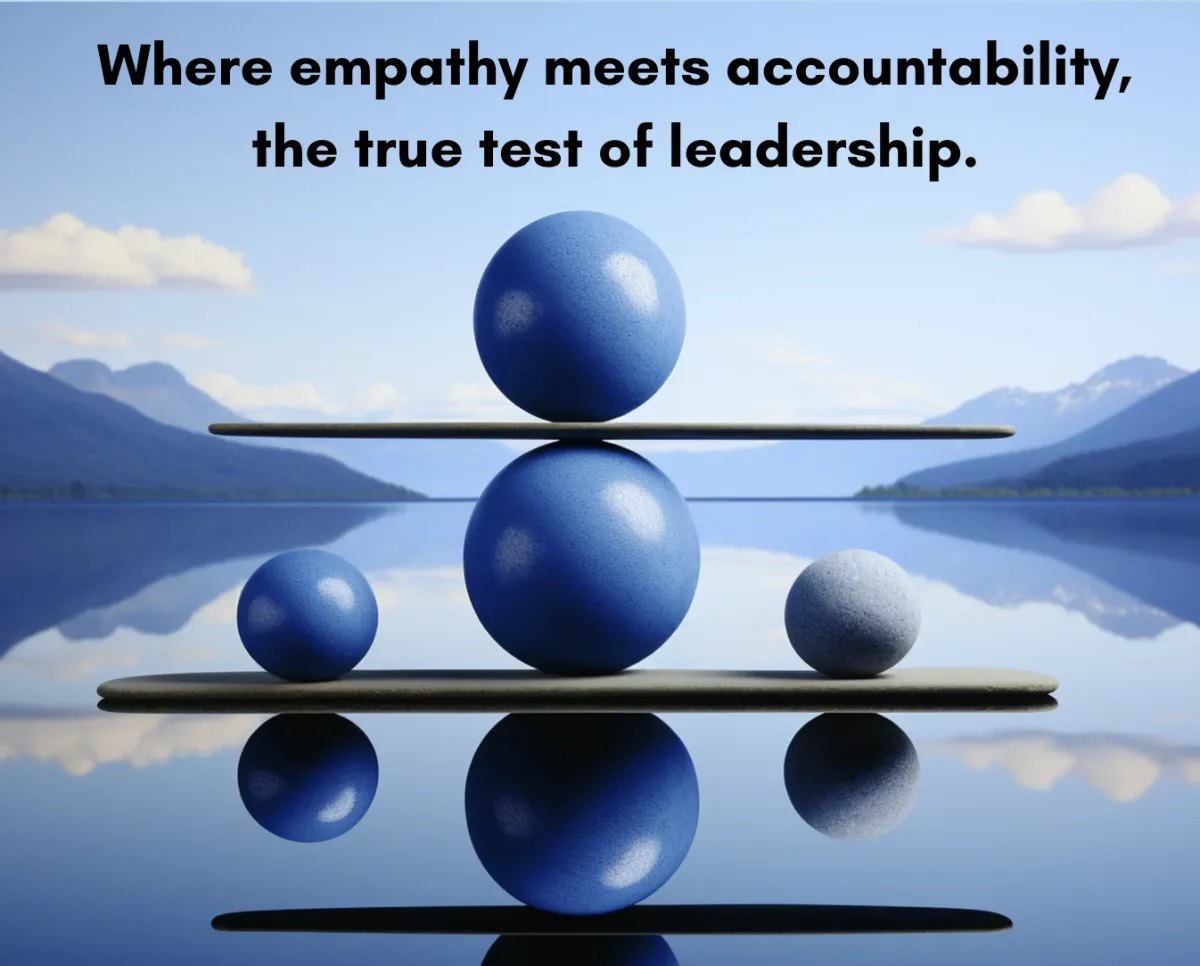Insights on Leadership

Accountability with Empathy: The Leadership Balancing Act
In today’s leadership landscape, few challenges are as universal or as misunderstood as the balance between empathy and accountability.
Leaders are told to be kind, compassionate, and emotionally intelligent. They are also told to drive results, hold teams accountable, and deliver measurable outcomes. Yet, in the tension between these two expectations lies the true test of leadership maturity.
Empathy and accountability are often framed as opposites: one soft, one hard; one about relationships, the other about results. But this is a false dichotomy. The best leaders know that empathy without accountability creates confusion, and accountability without empathy creates fear. The real power lies in learning to integrate both.
At N-BAC, we have seen this struggle play out across industries and leadership levels. From executives managing global teams to first-time managers stepping into new roles, the most consistent growth edge is learning how to hold people capable, not just comfortable.
Empathy and Accountability: Two Sides of the Same Coin
Empathy helps leaders understand the why behind people’s behaviors. Accountability ensures the what gets done. Both are essential.
Too much empathy, unanchored by standards, can lead to permissiveness. Too much accountability, without care, leads to compliance instead of commitment.
The balance begins when leaders understand that their role is not to choose between compassion and performance, but to create an environment where both coexist.
Empathetic accountability sounds like this:
“I understand the challenges you’re facing, and I still believe you can deliver this result.”
“You matter to this team, and your contribution matters too.”
“Let’s clarify expectations so you have what you need to succeed.”
These are not soft statements. They are clear, emotionally intelligent, and deeply human.
Why Empathy Alone Fails
Empathy without accountability often comes from good intentions. Leaders want to be liked. They want to avoid conflict. They want to show care.
But when empathy becomes over-accommodation, standards slip. Team members begin to feel directionless, unsure of where the bar really is. Ironically, what was meant to create safety ends up breeding unfairness and inconsistency.
We once worked with a senior leader in healthcare who was deeply caring and supportive of her team. Yet, she avoided giving feedback to underperformers because she didn’t want to “hurt morale.” Over time, high performers grew frustrated while weaker performers plateaued. When we coached her through our 4Cs of Feedback Framework (from the Embark Leadership Development Program), she found her stride. Her feedback became both kind and firm, and within months, the team’s engagement and results improved dramatically.
Empathy is not about shielding people from discomfort. It is about helping them navigate it with trust and purpose.
Why Accountability Alone Backfires
Accountability, when stripped of empathy, becomes transactional. Leaders focus on metrics, deadlines, and compliance. They may get short-term results, but they lose long-term loyalty.
Without empathy, feedback sounds like criticism. Goals feel imposed rather than inspired. Teams operate in fear of failure instead of a drive for excellence.
A financial sector executive we supported shared that after years of emphasizing results at all costs, he noticed his top talent leaving. In exit interviews, employees said the same thing: “I learned a lot, but I never felt seen.” That phrase—never felt seen—is the quiet killer of retention and innovation.
When leaders reintroduce empathy, accountability becomes collaborative, not punitive. People want to meet expectations when they believe their leader understands and values them.
Empathy That Elevates, Not Excuses
True empathy doesn’t excuse underperformance. It explains context so leaders can respond intelligently.
When a project misses the mark, empathetic leaders ask:
“What got in the way?”
“What support or clarity was missing?”
“How can we adjust the process to ensure success next time?”
This approach keeps responsibility intact while creating psychological safety. It signals to the team that accountability is not about blame but about learning.
Empathy at its best builds capability, not comfort. It allows leaders to hold high standards while helping others rise to meet them.
The Leadership Shift: From Comfort to Capability
At the core of this balance is a shift in mindset. Leadership is not about keeping people comfortable. It is about helping them become capable.
Empathetic leaders recognize that growth and discomfort often coexist. They know that being kind is not the same as being easy. They set clear expectations, provide consistent feedback, and support development along the way.
When empathy and accountability work together, leaders:
Clarify before they correct. They make sure expectations are explicit.
Connect before they challenge. They build trust so feedback is heard.
Coach instead of rescue. They help people solve their own problems rather than solving them for them.
This approach builds ownership. People stop waiting to be led and start leading themselves. It’s how cultures of accountability are born.
What High-Performing Organizations Do Differently
In high-performing organizations, empathy and accountability are not traits. They are systems.
They design clarity into every role. Everyone knows what success looks like and how their work contributes to the larger purpose.
They train leaders in emotional intelligence. Empathy is a skill, not a personality trait. Leaders learn to listen, recognize emotions, and respond thoughtfully.
They learn the type of feedback that works for their people and they normalize it. Feedback is ongoing, not reserved for annual reviews. It becomes part of daily dialogue, and they ensure they do it right.
They model accountability from the top. Executives own mistakes publicly. This creates permission for everyone else to take responsibility without fear.
They measure both performance and trust. Because great results are meaningless if they erode culture.
At N-BAC, we see this alignment most clearly in organizations that invest in leadership development early and often. When empathy and accountability are taught together through assessments, training, and coaching, the impact compounds across the culture.
Emotional Intelligence: The Connector
Emotional intelligence is what allows leaders to balance heart and standards. It gives them the self-awareness to regulate their own emotions, the empathy to understand others, and the social skill to navigate conflict effectively.
An emotionally intelligent leader doesn’t soften accountability. They strengthen it. Because they can read a room, sense tension, and choose words that land without harm. They don’t avoid tough conversations. They elevate them.
When leaders cultivate emotional intelligence, accountability stops feeling like confrontation and starts feeling like collaboration.
The Cost of Getting It Wrong
Leaders who fail to integrate empathy and accountability often pay hidden costs. Teams disengage. A-players get fed up and leave. The deeper cost of getting it wrong is keeping people in roles that don’t align with their strengths long enough.
When one leader stopped hiding behind empathy to avoid addressing underperformance, everything shifted. He had the hard conversations, gave direct feedback, and restructured the team, moving some members into roles that better fit their strengths. The result? Performance improved, and people felt happier and more engaged in positions that allowed them to thrive.
The lesson was clear: pressure without empathy leads to burnout, and empathy without clarity leads to chaos. But when both coexist, teams thrive.
The Future of Leadership: Holding Both
The leaders of the future will not be defined by charisma or command. They will be defined by their capacity to hold dualities—to be compassionate and direct, visionary and grounded, ambitious and humble.
Balancing empathy with accountability is not a soft skill. It is a strategic advantage. It builds trust, retains top talent, and drives consistent execution.
The future of leadership will belong to those who can integrate clarity with compassion, accountability with empathy, and strategy with emotional intelligence.
The next generation of exceptional organizations will not simply manage things and lead people. They will design systems that make human potential their competitive advantage.
At N-BAC, we help leaders and organizations find the balance between empathy and accountability, cultivating clarity, courage, and consistency across every level.
If your organization is ready to strengthen this balance, let’s connect.
Book a Strategy Call with N-BAC
Quick Links
Copyright 2026. N-BAC. All rights reserved.

